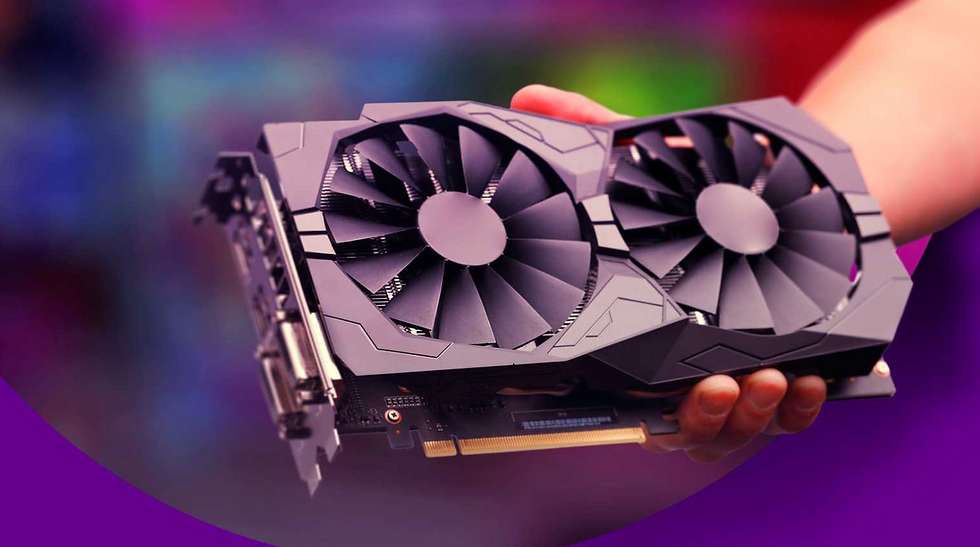What is the Recommended Frequency for Upgrading your GPU?
- Louis Sanchouz
- Aug 16, 2024
- 3 min read
Determining the optimal time to replace your GPU might be quite challenging. Regardless matter whether you are a gamer or a technology aficionado eager to remain at the forefront, a common inquiry persists: How frequently should one refresh their GPU?

Every three to five years
The majority of experts advise upgrading your GPU every three to five years. This duration achieves an equilibrium between being current with the latest technology and maximizing the value of your existing card.
To consistently achieve optimal performance, target the three-year benchmark. You will maintain your system at a near cutting-edge level and may obtain a reasonable sum by selling your old card. However, if your priority is maximizing value for your expenditure, extending to five years may be advisable.
This is particularly applicable if your existing configuration has a high-performance GPU that is sufficiently robust to remain pertinent for an extended duration. Prolonged waiting allows for the acquisition of a newer model that provides a substantial enhancement in performance, rendering the upgrade more consequential.
When Your Existing GPU Is Insufficient
The precise timing of your GPU update will depend on your personal requirements and the performance of your existing GPU. If your existing GPU can no longer support the games or programs you wish to run, it may be prudent to contemplate an update, irrespective of the 3-5 year benchmark.
Consider a gamer who is engaged with contemporary open-world masterpieces like as Elden Ring. They will require more frequent upgrades than an individual content with playing esports classics such as Counter-Strike. Likewise, if you engage in high-resolution video editing, such as 4K, your GPU will experience significantly greater stress than that of a typical web user.
If your GPU is inadequate for your daily work, and you have previously optimized your settings or upgraded other components, it may be time to consider an update. An upgraded GPU represents a cost-effective enhancement for your PC. Nonetheless, upgrading when postponement is feasible remains unjustifiable. Your requirements should dictate the decision, rather than merely the allure of novel technology.
When You Have Upgraded Your Central Processing Unit
A critical moment to contemplate a GPU improvement is subsequent to a CPU enhancement. Your graphics card and processor operate in tandem, and if one is markedly more powerful than the other, you may encounter a bottleneck.
This is particularly crucial in gaming, as the CPU manages game logic and artificial intelligence, while the GPU outputs images. If one is significantly more advanced, your games will not operate as efficiently as possible.
Conversely, if you want to update your CPU shortly, it may be prudent to postpone your GPU upgrade until then. This approach guarantees optimal compatibility between the components, maximizing the efficiency of your system.
When It Exhibits Indications of Deterioration
Similar to any component, your GPU will exhibit indications when it approaches the conclusion of its lifespan or struggles to meet your demands. Regardless of whether you have utilized the same GPU for an extended period or have lately installed it, it is essential to recognize warning signs that may suggest the necessity for a GPU upgrade or replacement.
One can diagnose prevalent GPU issues such as overheating and sporadic artifacts. Nevertheless, if you encounter these issues frequently or observe additional symptoms such as abrupt FPS declines or unanticipated crashes, it may be prudent to consider an upgrade.
It is alluring to upgrade solely due to the release of a new GPU. However, newer does not necessarily equate to superior for your particular need. It is prudent to consider: Will this new GPU significantly impact my intended usage? Will the new features or performance enhancements provide me with tangible benefits?
If you are upgrading solely for the latest hardware, you may wish to reevaluate your decision. Occasionally, postponing your upgrade until your existing GPU is truly underperforming can be a more prudent strategy, enabling you to invest in a more significant enhancement later.



Comments